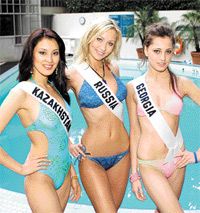Language /
Adjective/Noun Order? [20]
ArcticPaul
I think you're trying to absorb too much theorical knowledge for a beginner.
Generally, in simple sentences, the adjective precedes the noun.
Mam
starszego brata i
młodszą siostrę. (I have an older brother and a younger sister.)
but
Mam
brata starszego o dwa lata i
siostrę młodszą o trzy lata. (
literally, because I don't know how to say it in English: I have a brother older two years and a sister younger three years.)
(In the second example the adjective is extended so it wouldn't "fit" before the noun, stupid explanation, I know.)
And the adjective comes
after the noun in expression that are more or less fixed, so the adjective isn't describing a trait of the noun, but it's rather limiting its meaning:
przerwa techniczna (
tto, technical timeout, in volleyball, 1st after 8th point, then after 16th point).
So you'd say:
Na
pierwszej przerwie technicznej Polki prowadziły 8-5, a na
drugą przerwę techniczną zeszły z pięciopunktowym prowadzeniem (16-11).
At the 1st tto Poland were leading 8-5, and they went for the 2nd tto with a 5 point lead (16-11).
This applies also for example to animals species (and many other things):
bawół europejski - European buffulo (if such a species exists)
bawół is a wide range of animals, europejski limits the noun to one species, that's why it follows the noun, on the other hand, a wounded buffulo = ranny bawół, because the adjective here describes the noun in the natural way.
dom publiczny - wh*orehouse
biblioteka publiczna - public library
but:
publiczne przyznanie się do winy - public confession of one's fault (here the adjective is first, because it describes how the confession was made, i.e. publically)
 PolishForums LIVE / Archives [3]
PolishForums LIVE / Archives [3]
